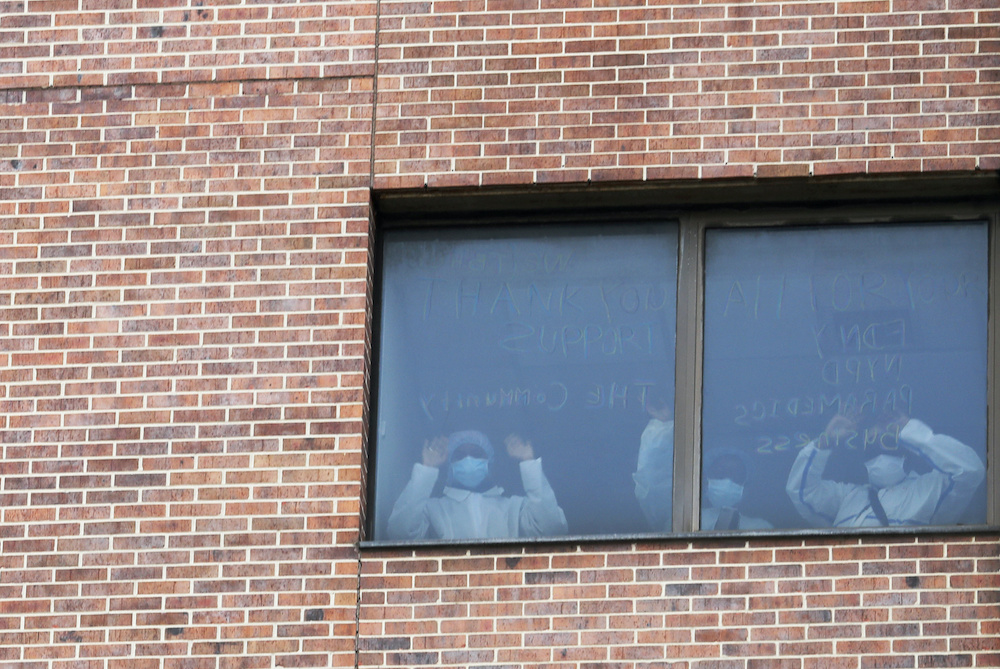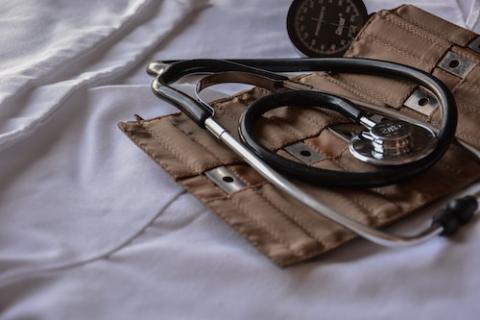
Health care workers in the Brooklyn Hospital Center in New York City react as residents and members of the New York City Fire Department cheer for them April 20. (CNS/Reuters/Lucas Jackson)
Editor's note: Mary Catherine Redmond is a Sister of the Presentation of the Blessed Virgin Mary and physician assistant serving in New York City. This is her second column about what it's like during the pandemic. You can read "I'm providing health care, and prayer, during COVID-19" here.
The days continue to bring new lessons to medical providers fighting for our patients. It has become clear that putting patients on respirators is not very effective, as only 10% of intubated patients come off the respirators. The others have died and our hearts break every time we learn that a patient we tried to save is no longer in our Intensive Care Unit (ICU) or the many makeshift ICUs scattered around our hospital that are now part of the Emergency Department (ED). We remember our last moments with our intubated patients, and our hearts break knowing we were the last people they saw in their time of isolation.
We thought that if we assisted their breathing and helped them heal, our treatment would be effective. Now we know that often this disease leads to kidney and liver failure in addition to respiratory failure. It is overwhelming to realize that not much can be done. All the years I studied so hard to heal, and I can't do it. And I pray fervently with Psalm 22, "My God, My God, why have you forsaken me?"
The pain for the staff is palpable as we wonder what we should have done — or what we can do? I find myself consoling people who are raw and vulnerable with emotion. Walking out of a room, I ask an emergency medical services (EMS) worker how she is doing. I almost walked past, but she burst into tears talking about how hard it is on the streets these days. EMS is the first on the scene. Patients can be talking one moment and gasping for air and dead in the next. It happens in the hospital, too, and we are shocked by how quickly it occurs. EMS is then left at the scene with the patient and the family. This EMS worker cried about a 24-year-old son begging for his father to live. She admitted her fears about going home to her two small girls — one, that she doesn't bring the virus home; and two, that she can somehow go home and be the Mom her children knew before this virus started. I stand with her in her tears, encouraging her to cry. The tears are real and healing and felt by so many of us these days.
The determination we had to heal people as COVID-19 began turned our Emergency Department into a M.A.S.H. unit, fighting for resources to save lives. We are now turning to accompaniment: being with the patients, connecting with their families, and walking with each other. I find now that my pastoral sense is more in need as the medical director calls me into a family phone meeting to tell the mother of a 22-year-old boy that her son has died. Her wails break our hearts and the pain is palpable — even on the phone. She repeatedly says, "Oh, dear Jesus, hold my baby boy." I assure her that Jesus is holding her baby boy and Jesus is holding her in her pain as well. I promise that I will follow up with her.
Advertisement
On the next call, I tell her that I am a religious sister and she cries again, "God bless you and keep you safe." She tells me how he was an altar boy and relates stories of his latest work as a photographer. All she wants is to see her son one more time and she is hoping the funeral home will help her do that. There is such confusion with so many bodies and personal effects, and I follow up to make sure that she gets her son's belongings. It is so painful.
I have had several conversations with this mother. She was Mary in my holy week as she lay her son to rest. She tells me that they picked out a beautiful place in the cemetery for him — right near a statue of the blessed mother. She asks me if she can take me to his grave, later. I say yes of course, and assure her there will be a time when I can give her a big hug. She is comforted by the prayers of my religious community.
As we learn more, we now try less invasive techniques to help people in their breathing and it does seem to be working. We are also much more realistic about the outcome of patients with many underlying diseases besides COVID-19. I find myself in very frank and heart-wrenching conversations with patients about what their wishes are for the end of their life. I am medically realistic, as we fight this demon, and wonder how I will ever practice medicine again — will my brain ever be able to think logically through disease processes that I can treat, without reacting in fear? I have worked for 20 years as a physician assistant, strong in my skills, and now the overwhelming COVID-19 has left me unsure of my medical ability.
I meet a brother and sister, 77 and 80, brought in by EMS. The brother — older and with many medical problems — looks like he is close to death. His sister, who has been taking care of him, is stronger and so I talk with her, after a futile attempt to get a response from the patient, about what the arrangements were for his health care. A proxy? Wishes? She states through an interpreter that she doesn't know why we are having this conversation, but she would want him to be made comfortable. No heroic measures. (I know in my heart and my experience of this disease that heroic measures would be futile.)

(Unsplash/Marcelo Leal)
I thank God she is also a patient because I can at least get her into his room to be with him for a little while. My supervising physician, concerned about her safety, reluctantly agreed to let her visit. I knew it was the right thing to do. She sat in a wheelchair by his bed, held his hand, straightened his covers and then held his hand again. The scene breaks my heart; as I leave my shift I sit in the car and sob for the loss she is going to endure. I am not the only staff member to cry, to be heartbroken. Neither we nor the doctors are used to this level and intensity of death.
The Scriptures of the week have given me strength. This Holy Week was like no other, for everyone. I now cling to the words from Isaiah, "Here is my servant whom I uphold. . .Upon whom I have put my Spirit." As I am introduced at a palliative care meeting, I now realize that others in the hospital — who I have only talked to on the phone but now am getting to know by face — cling to my role as religious sister/medical provider. The demanding needs of this time have placed me on the Ethics and Palliative Care Committees at our hospital. And I again pray with Isaiah, "The Lord God has given me a well-trained tongue, that I might know how to speak to the weary a word that will rouse them." I pray for the words that will convey accompaniment, solidarity, peace and comfort.
I feel an overwhelming presence of God in my prayer and daily experiences as I walk to Calvary, carrying the cross as Simon of Cyrene and wiping the face as Veronica did. I know the prayer, Father, if you could just "take this cup away from me," and I know I am standing at the foot of the cross, as I walk through an ICU, see people clinging to life, and try desperately to connect them with their families. My Good Friday was spent doing palliative care.
There is such a need right now to reach families and let them know about their loved one before they receive the call they have died. There are so many. But today at 3 p.m., I have a conversation with Michael, whose mother is dying of COVID-19. He is rushing home to tell his father, for whom he is now scared. As he passes co-workers he is saying, "My mother is not going to make it." I am humbled as he profusely thanks me for reaching out and explaining to him what is happening.
I sit in the quiet of Holy Saturday. I know tomorrow is Easter, but I am not sure when my Alleluia will ring out; right now, it feels like an affront to others who are still on the road to Calvary. I do know that there will be Alleluias. My faith tells me so. Alleluia will be different this year, and I pray that this time will bring us to a greater understanding of who we consider as "other." I pray that we will own our racial biases and unjust treatment of the poor and that after this experience things will be different. I continue to pray that we truly all will be one. That is my undying prayer as I minister each day — we are all one. May our lives reflect that radically when this crisis passes.
[Mary Catherine Redmond is a Sister of the Presentation of the Blessed Virgin Mary. She has ministered in various aspects of health care and is presently serving as chief physician assistant in hospital emergency medicine, serving the underserved of New York City. She has worked also in her congregation in vocation and formation ministry. Her formal training in counseling and in facilitation has also led her to do spiritual direction, retreats and small group faith communities, and to facilitating groups around the topics of new membership, leadership and "new member" gatherings.]





